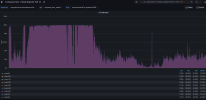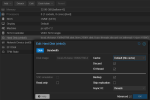So far so good. It seems that the problem is gone. With a windows server 2022 vm and around 60 rdp users no freezes so far. With 6.5 kernel after 2 or 3 hours i had to disable NUMA.
lscpu
Architecture: x86_64
CPU op-mode(s): 32-bit, 64-bit
Address sizes: 46 bits physical, 48 bits virtual
Byte Order: Little Endian
CPU(s): 88
On-line CPU(s) list: 0-87
Vendor ID: GenuineIntel
BIOS Vendor ID: Intel(R) Corporation
Model name: Intel(R) Xeon(R) CPU E5-2699 v4 @ 2.20GHz
BIOS Model name: Intel(R) Xeon(R) CPU E5-2699 v4 @ 2.20GHz CPU @ 2.2GHz
BIOS CPU family: 179
CPU family: 6
Model: 79
Thread(s) per core: 2
Core(s) per socket: 22
Socket(s): 2
Stepping: 1
CPU(s) scaling MHz: 92%
CPU max MHz: 3600.0000
CPU min MHz: 1200.0000
BogoMIPS: 4394.92
Flags: fpu vme de pse tsc msr pae mce cx8 apic sep mtrr pge mca cmov pat pse36 clflush dts acpi mmx fxsr sse sse2 ss ht tm pbe syscall nx p
dpe1gb rdtscp lm constant_tsc arch_perfmon pebs bts rep_good nopl xtopology nonstop_tsc cpuid aperfmperf pni pclmulqdq dtes64 monito
r ds_cpl vmx smx est tm2 ssse3 sdbg fma cx16 xtpr pdcm pcid dca sse4_1 sse4_2 x2apic movbe popcnt tsc_deadline_timer aes xsave avx f
16c rdrand lahf_lm abm 3dnowprefetch cpuid_fault epb cat_l3 cdp_l3 intel_ppin ssbd ibrs ibpb stibp tpr_shadow flexpriority ept vpid
ept_ad fsgsbase tsc_adjust bmi1 hle avx2 smep bmi2 erms invpcid rtm cqm rdt_a rdseed adx smap intel_pt xsaveopt cqm_llc cqm_occup_ll
c cqm_mbm_total cqm_mbm_local dtherm ida arat pln pts vnmi md_clear flush_l1d
Virtualization features:
Virtualization: VT-x
Caches (sum of all):
L1d: 1.4 MiB (44 instances)
L1i: 1.4 MiB (44 instances)
L2: 11 MiB (44 instances)
L3: 110 MiB (2 instances)
NUMA:
NUMA node(s): 2
NUMA node0 CPU(s): 0-21,44-65
NUMA node1 CPU(s): 22-43,66-87
Vulnerabilities:
Gather data sampling: Not affected
Itlb multihit: KVM: Vulnerable
L1tf: Mitigation; PTE Inversion; VMX vulnerable
Mds: Vulnerable; SMT vulnerable
Meltdown: Vulnerable
Mmio stale data: Vulnerable
Reg file data sampling: Not affected
Retbleed: Not affected
Spec rstack overflow: Not affected
Spec store bypass: Vulnerable
Spectre v1: Vulnerable: __user pointer sanitization and usercopy barriers only; no swapgs barriers
Spectre v2: Vulnerable, IBPB: disabled, STIBP: disabled, PBRSB-eIBRS: Not affected
Srbds: Not affected
Tsx async abort: Vulnerable
uname -a
Linux pve 6.8.1-1-pve #1 SMP PREEMPT_DYNAMIC PMX 6.8.1-1 (2024-04-02T16:19Z) x86_64 GNU/Linux
grep "" /proc/sys/kernel/numa_* /sys/kernel/debug/sched/preempt /sys/kernel/mm/ksm/*~
/proc/sys/kernel/numa_balancing:1
/proc/sys/kernel/numa_balancing_promote_rate_limit_MBps:65536
/sys/kernel/debug/sched/preempt:none (voluntary) full
grep: /sys/kernel/mm/ksm/*~: No such file or directory
PS: the vm has 80GB memory - 22 cores (numa 2x11) and i have ksm and mitigations disabled.
lscpu
Architecture: x86_64
CPU op-mode(s): 32-bit, 64-bit
Address sizes: 46 bits physical, 48 bits virtual
Byte Order: Little Endian
CPU(s): 88
On-line CPU(s) list: 0-87
Vendor ID: GenuineIntel
BIOS Vendor ID: Intel(R) Corporation
Model name: Intel(R) Xeon(R) CPU E5-2699 v4 @ 2.20GHz
BIOS Model name: Intel(R) Xeon(R) CPU E5-2699 v4 @ 2.20GHz CPU @ 2.2GHz
BIOS CPU family: 179
CPU family: 6
Model: 79
Thread(s) per core: 2
Core(s) per socket: 22
Socket(s): 2
Stepping: 1
CPU(s) scaling MHz: 92%
CPU max MHz: 3600.0000
CPU min MHz: 1200.0000
BogoMIPS: 4394.92
Flags: fpu vme de pse tsc msr pae mce cx8 apic sep mtrr pge mca cmov pat pse36 clflush dts acpi mmx fxsr sse sse2 ss ht tm pbe syscall nx p
dpe1gb rdtscp lm constant_tsc arch_perfmon pebs bts rep_good nopl xtopology nonstop_tsc cpuid aperfmperf pni pclmulqdq dtes64 monito
r ds_cpl vmx smx est tm2 ssse3 sdbg fma cx16 xtpr pdcm pcid dca sse4_1 sse4_2 x2apic movbe popcnt tsc_deadline_timer aes xsave avx f
16c rdrand lahf_lm abm 3dnowprefetch cpuid_fault epb cat_l3 cdp_l3 intel_ppin ssbd ibrs ibpb stibp tpr_shadow flexpriority ept vpid
ept_ad fsgsbase tsc_adjust bmi1 hle avx2 smep bmi2 erms invpcid rtm cqm rdt_a rdseed adx smap intel_pt xsaveopt cqm_llc cqm_occup_ll
c cqm_mbm_total cqm_mbm_local dtherm ida arat pln pts vnmi md_clear flush_l1d
Virtualization features:
Virtualization: VT-x
Caches (sum of all):
L1d: 1.4 MiB (44 instances)
L1i: 1.4 MiB (44 instances)
L2: 11 MiB (44 instances)
L3: 110 MiB (2 instances)
NUMA:
NUMA node(s): 2
NUMA node0 CPU(s): 0-21,44-65
NUMA node1 CPU(s): 22-43,66-87
Vulnerabilities:
Gather data sampling: Not affected
Itlb multihit: KVM: Vulnerable
L1tf: Mitigation; PTE Inversion; VMX vulnerable
Mds: Vulnerable; SMT vulnerable
Meltdown: Vulnerable
Mmio stale data: Vulnerable
Reg file data sampling: Not affected
Retbleed: Not affected
Spec rstack overflow: Not affected
Spec store bypass: Vulnerable
Spectre v1: Vulnerable: __user pointer sanitization and usercopy barriers only; no swapgs barriers
Spectre v2: Vulnerable, IBPB: disabled, STIBP: disabled, PBRSB-eIBRS: Not affected
Srbds: Not affected
Tsx async abort: Vulnerable
uname -a
Linux pve 6.8.1-1-pve #1 SMP PREEMPT_DYNAMIC PMX 6.8.1-1 (2024-04-02T16:19Z) x86_64 GNU/Linux
grep "" /proc/sys/kernel/numa_* /sys/kernel/debug/sched/preempt /sys/kernel/mm/ksm/*~
/proc/sys/kernel/numa_balancing:1
/proc/sys/kernel/numa_balancing_promote_rate_limit_MBps:65536
/sys/kernel/debug/sched/preempt:none (voluntary) full
grep: /sys/kernel/mm/ksm/*~: No such file or directory
PS: the vm has 80GB memory - 22 cores (numa 2x11) and i have ksm and mitigations disabled.
Last edited:



